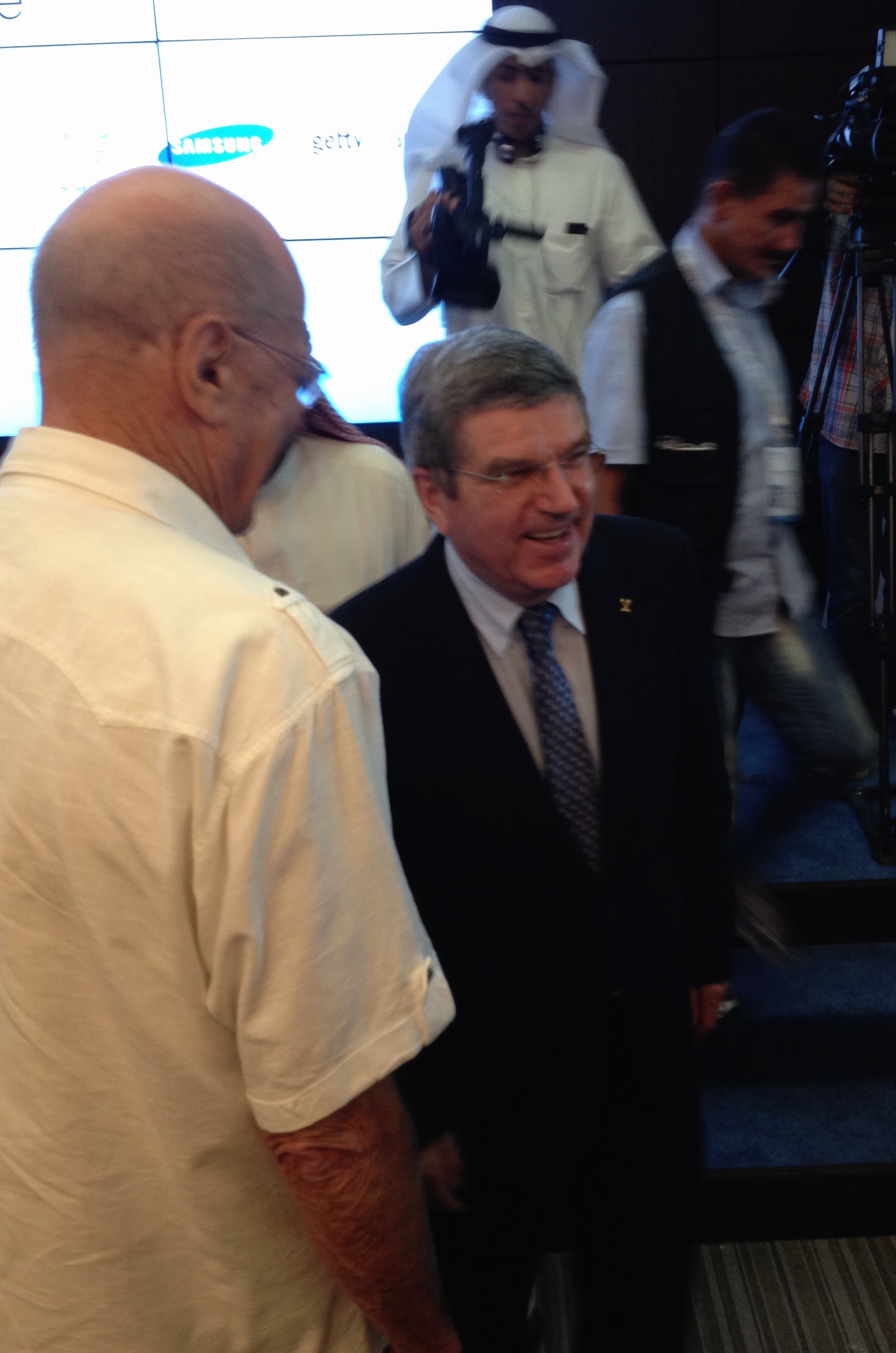KUWAIT CITY, Kuwait — Accounting for the sudden resignation a couple days ago of French ski legend Jean-Claude Killy, there are now 106 active members of the International Olympic Committee. As the IOC president, Thomas Bach, pointed out in a news conference Sunday morning, Arabic hospitality is known worldwide.
Maybe that is why a reported 41 IOC members gave up their weekend to come to Kuwait to attend the meeting of the 204-member Association of National Olympic Committees.
Or perhaps it is a signal of the considerable influence of Sheikh Ahmad Al-Fahad Al-Sabah — who, among other roles, is the ANOC president — that some four of 10 IOC members came to Kuwait from around the world.
Here, among others: IOC vice president and Rio 2016 coordination chair Nawal El Moutawakel of Morocco. Executive board members Pat Hickey of Ireland and Gunilla Lindberg of Sweden.
IOC athletes’ commission chair Claudia Bokel of Germany, another executive board member.
Larry Probst, the U.S. Olympic Committee board chairman and new IOC member.
And many more influential personalities within the Olympic sphere — among them, SportAccord and International Judo Federation president Marius Vizer.
The Sochi Games closed just roughly five weeks ago.
The IOC executive board meeting, to be held in conjunction with the SportAccord conference in Turkey, goes down next week.
It’s not as if IOC members are — or were — lacking for opportunities to get together.
Yet here they were.
For ANOC, this was in fact something of a history-making occasion. On Saturday, it held a variety of commission meetings — that is, the first time its commissions were said to have had these kinds of meetings, all designed as a lead-up toward the ANOC general assembly this fall in Bangkok.
And then there was the pull of having Bach on hand as well.
“It’s a big honor to welcome the president of the International Olympic Committee here in Kuwait,” Sheikh Ahmad said at that same news conference.
Bach said, “We are having a broad discussion among all the stakeholders of the Olympic movement,” adding a moment later that the weekend involved “looking into the future and looking into the different roles of the stakeholders and ensuring the harmonious roles under the leadership of the IOC.”
Much of 2014, of course, is being devoted to what Bach has called “Olympic Agenda 2020,” a far-reaching review of what works — and what doesn’t — as the IOC and the broader movement, now past Sochi, regroups and looks toward Rio 2016, the 2022 Winter and 2024 Summer bid cycles and beyond.
Bach took a moment to note the “great success of the Sochi Games,” in contrast to the doom and gloom that preceded virtually all the talk beforehand.
Five bid cities are in the 2022 pipeline: Almaty, Kazakhstan; Beijing; Krakow, Poland; Lviv, Ukraine; and Oslo. Lviv must confront political upheaval; Krakow now looks set to deal with a referendum; Oslo is grappling with local challenges to long-held assumptions about who bears what responsibilities in the bid system.
How many of the five applicants will ultimately see it through to the 2015 IOC election in Kuala Lumpur, Malaysia, remains decidedly unclear.
A “candidature for the Games,” Bach said — reflecting on how the “great positive legacy” of Sochi is now “well understood by the respective cities and countries” — is a “great opportunity to transform a region and a society for the better.
“Therefore, I am not too worried.”
As for Olympic Agenda 2020, he laid out a timeline, apparently for the first time publicly, for getting to the IOC’s all-members extraordinary session in Monaco in December. There the issues will be debated and, presumably, decisions will be taken. Or, more likely, ratified:
— The special special email address set up to solicit suggestions from around the globe — OlympicAgenda2020@olympic.org — closes April 15.
— Working groups will convene, probably in June.
— July will see a summit of sorts, the presidents of the major stakeholders.
— In September, the results from the working groups and the “summit” will go to the IOC commissions. Bach is due to announce in the next few days the make-up of the 2014 commissions.
— In October, the commissions are due to make recommendations to the executive board.
— The board will prepare a document to be submitted to the extraordinary session, set for Dec. 6-7.
“This will give us a good opportunity, as the president has mentioned … to keep the values of the movement and the main ideals of the movement but also to develop the relationships,” Sheikh Ahmad said.
And if you want to know why more than 40 IOC members made their way this weekend to the Persian Gulf, there you have it.
Life is a relationship business. Especially in the IOC.
Who understands this principle?
Thomas Bach.
And the host for the weekend, Sheikh Ahmad Al-Fahad Al-Sabah. You had better believe he understands this is how things get done.


